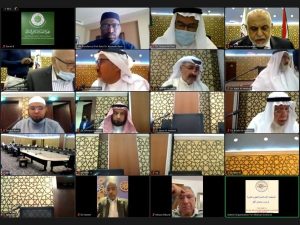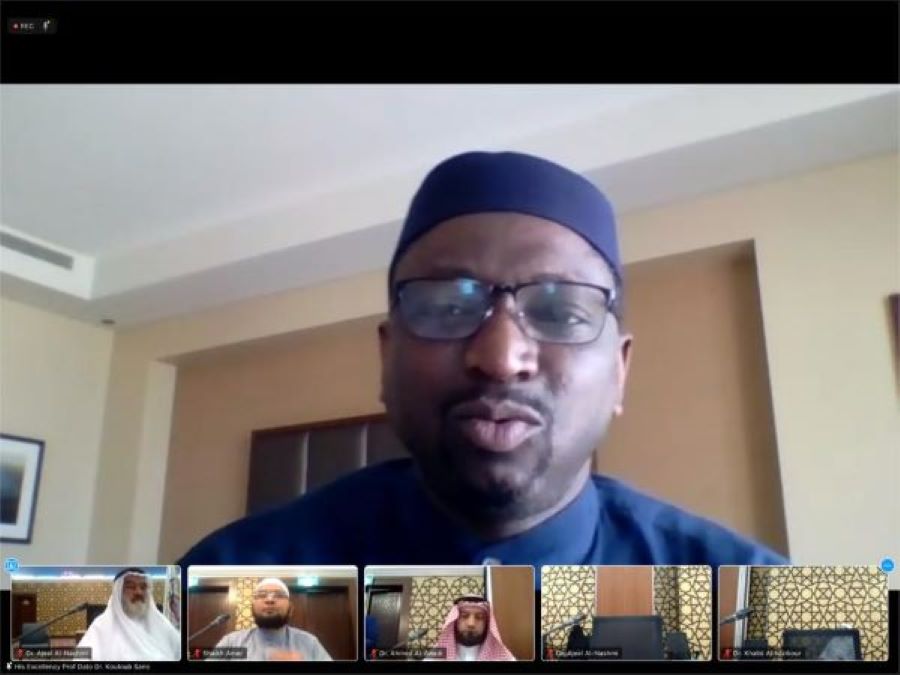
At the invitation of the Islamic Organization for Medical Sciences in the State of Kuwait, His Excellency Prof. Koutoub Moustapha Sano, Secretary General of the International Islamic Fiqh Academy (IIFA), gave a keynote speech at the opening of a medical jurisprudence symposium on “Problems of workers in the fields of obstetrics and gynecology, and test-tube babies from an ethical perspective.” On Saturday 1 Rabi’ al-Thani 1443H, corresponding to 06 November 2021G via virtual communication technologies.
His Excellency began his speech by expressing his great thanks and great appreciation to those in charge of the Islamic Organization for Medical Sciences for their appreciated efforts in order to direct calamities and medical developments based on the provisions of the noble Shariah with its maxims, rules, and purposes to enable all Muslims to adhere to the teachings of their religion. His Excellency also expressed his great pleasure for the organization dedicating this symposium to obtain satisfactory Fiqh answers to the questions and problems facing workers in the public health sector and the obstetrics and gynecology sector in particular.
Hoping to reach a balanced formulation of the shariah rulings appropriate to the various problems related to this field, His Excellency suggested to the shariah jurists and muftis who respond to the questions of the public health workers, to start from a set of certain methodological foundations to set the appropriate shariah rulings, and these pillars are represented in the adherence to the general principles of Shariah, rely on the purposes of Shariah, and refer to the major Fiqh maxims, and then consider the consequences of actions.
His Excellency concluded his speech by saying: “The statement of Sharia rulings and rulings related to problems facing workers in the fields of gynecology, obstetrics and test-tube baby should be based on holistic rules, shariah rules, methodological foundations, upon which the Mufti relies, and proceeds through it, enlightening him the way and enabling him to give the shariah rulings and the effective solutions to the problems that this symposium poses. And among those rules there is: *First: the general principles of Shariah*: By that I mean: the noble Koran and the honorable prophetic hadiths that commanded to preserve and protect oneself, the obligation of seeking medical care, the obligation of cleanliness, the prohibition of harming oneself, and other rules of the noble Shariah.
These Qur’anic and hadith texts represent general principles that must be implemented in order to establish the legal rulings and effective solutions to the problems we face, given that the generality contained in these texts is generality in time, place, person, condition, and situation, and is not limited to an era, or to a country, but is rather meant to all generations, to all times, and to all countries. *Secondly: the general purposes of Shariah* and the attention to its ranks: it is agreed that the sources of legislation refer to the Qur’an and the Sunnah, and that there is no emerging issue, whether it is small or large, but that does have a ruling in them, either an explicit text, or a sign and a gesture, and this is known by the trustworthy and capable scholars. The Almighty said: {And when there comes to them something [i.e., information] about [public] security or fear, they spread it around. But if they had referred it back to the Messenger or to those of authority among them, then the ones who [can] draw correct conclusions from it would have known about it.} An-Nisa: 83. The knowledge of the secrets, the wisdom, and purposes hidden inside the Shariah texts, would enable the Muslim to comply with the provisions of Shariah seamlessly and with reassurance, comfort, and stability.
And since it is agreed that all the shariah rulings were issued in order to preserve five necessary objectives, which are the preservation of the soul, the preservation of the religion, the preservation of offspring, the preservation of the mind, and the preservation of money, then the vast majority of people who are knowledgeable in Usul consider the preservation of the soul a priority over the rest of the purposes, and therefore , it is possible to sacrifice all of them for the sake of self-preservation, which means to abandon compliance with religion if that leads to the loss of the soul, as is the case of forced disbelief, severe illness, severe hunger and other emergencies and pandemics. And thirdly: the use of major Fiqh rules: * Fiqh rules represent summaries of texts and purposes, and materials guiding various issues that arise in human life, and therefore, these summaries represent answers to a number of emerging and renewed questions that arise from time to time and are used by the astute jurist in directing developments, answering calamities, highlighting the comprehensiveness of the Shariah and its ability to keep pace with everything new.
Accordingly, there are jurisprudential rules that are capable of clarifying the Shariah rulings for every development and incident, and among the most important of these rules is the rule of “no harm to either party”, the rule of necessity permits prohibition, the rule of the imam’s behavior towards the subjects is dependent on the general interest, the rule of warding off corruption takes precedence over bringing benefits, the rule of the harm is removed, the rule of hardship brings facilitation, and the rule of actions depend on purposes, and so forth. Fourthly: Paying attention to the consequences of actions: the reliance on consequences is a blessed Shariah principle, and a familiar behavior from shariah in a number of rulings mentioned in the Qur’an and the Sunnah. The importance of this principle lies in the fact that it is the ruling that is invoked by the extent to which it is taken or reluctance to adopt a ruling established in the Shariah, so if the consequences of doing it were corrupting, then it must be refrained from it, and similarly, in case the effects of refraining were corrupting, then it must be done. This means that the shariah ruling does not mean the necessity of compliance or refraining from it, but it is correct to comply with it if it does not result in a significant corruption.
These are brief contributions to enable the Muftis to know the foundations of fatwas and ijtihad in various emerging medical or moral issues, in light of the principles, purposes, and outcomes.”
It is worth mentioning that a group of distinguished Shariah scholars and a number of doctors and health practitioners participated in the symposium, where they presented their questions to the Shariah jurists to clarify the appropriate Shariah rulings for each problem and inquiry.
Read Also
Lastest








